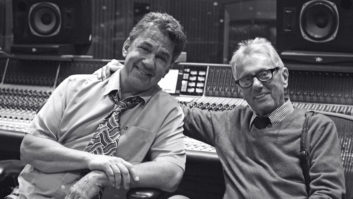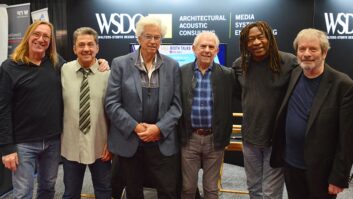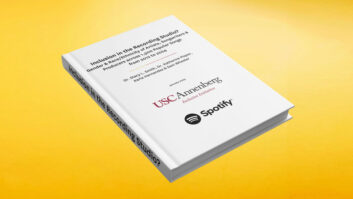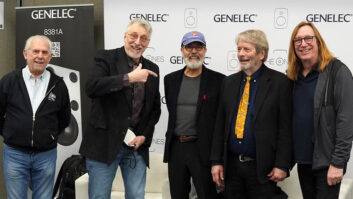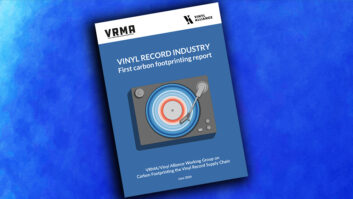
It already seems so long ago when we went about our days uninterrupted by thoughts of viruses, yet only a few weeks have passed since many of us began isolating at home. Before all this, I visited the new Sterling Sound mastering facility here in Nashville to listen to the mastering work that Ted Jensen had done on a new artist for me. After a short tour, we listened in his beautiful new room. The resolution of his system was jaw-dropping.
With all of this time I’m now spending at home (and once I reached the limit of how much news I could watch on CNN), I started working on my home studio setup to achieve better results, like what I heard at Sterling.
After a bunch of tweaking, measuring, moving speakers, analyzing, moving speakers more, changing cables, adding subs and absorption panels and listening—lots of listening—I’m nearly there. When I was a kid, somebody should have told my parents that listening to music was addictive because that’s all I wanted to do, but after all these years of listening for my job, I’d sort of lost that passion a little. Now, through all of this listening as I rework my home studio, I realized that I was enjoying just listening to music again.
Part of my system upgrade was a new D-A converter made by dCS that can also stream music and decode the Hi Res MQA files from streaming services like Amazon, Tidal and Qobuz. I’ve got a Tidal account and I kept finding myself drawn to the Hi Res albums while checking the progress of my setup. It got me thinking that maybe the reason I’m enjoying music so much these days is that I’m hearing recordings with resolution like the way I work, and that the lower resolution of CDs, MP3s and regular streaming was subconsciously playing a part in my apathy toward music.
The METAlliance Report: Grid Versus Groove
The METAlliance Report: How to Choose Your Next Studio Monitors
The METAlliance Report: Staying Healthy in the Studio
Now that I’m listening to Hi Res streaming, I’m like a kid again. I find myself lost in listening and searching for new music. While the dCS converter is on the very high side of expensive for a stereo D-to-A converter, to say the least, you can experience much of the same thing with a more economical streaming device, perhaps one that incorporates MQA decoding made by Blue Sound or other manufacturers. I highly suggest you try it. If you still aren’t making your recordings at 96k or better, it’s time to begin, as Hi Res to the consumer is here.
Other things I’ve been doing while on lockdown include software upgrades, deploying more UAD cards from my studio DAW to use with my home system, testing a very cool new mic for a METAlliance certification, playing guitar, playing with the new puppy, mowing the yard, taking my other dog for walks in the country, riding the motorcycle (the perfect social distancing activity as there’s no one on the road), playing Rummikub with my wife JoJo, and eating far too much.
Al Schmitt says he keeps trying to get better—a great inspiration. He told me, “Since I’m not going out to listen to music, I have been spending my time listening to piano recordings, because I believe the piano is one of the more difficult instruments to record correctly. What I found is that the best piano sounds are recorded using two or three mics. (Placement is key, of course.)
“I suggest that if you are going to record piano with an artist—I picked Joe Sample—listen to as many piano recordings as possible, pick the ones you like best, and try to duplicate those as much as possible. I’ve also been doing this with solo saxophone. It’s amazing how different the soloist from the ’40s through the ’60s sounded versus the soloist from today. Try something like this. There is so much good music out there, and if you love music like I do, you will never get bored. I love listening to music recorded by great engineers, and I still wonder how the hell they got those great sounds. Whenever possible, I try to get in touch with the engineer and ask about mics and setups they used. I promise you, listening to good recordings will never bore you.”
Frank Filipetti has taken on an energetic venture recently: “I made the jump to mixing in-the-box nearly a dozen years ago, so the newly developing paradigm of working in isolation hasn’t disrupted my workflow in any significant fashion. What has changed is my location. I had made the decision to move from my home in West Nyack, NY, to Waterford, CT, in late December. We closed on the new house (actually an old house, built in 1750) in early March, just two weeks before the crisis changed everything. My new old home has an outbuilding that was constructed in 1816 as a Baptist chapel. Although smaller than my West Nyack facility, it is an A-frame, all-wood room with stunning acoustics. The lockdown has provided me with an opportunity to set up my new studio with a lot more consideration and care. This time I have the time to actually label all the cables, which is something I regretted not doing in West Nyack.
“My stereo setup is up and running, and my 5.1.4 surround setup should be operational within the next two weeks. As surround mixing is still my favorite way to work, I can’t wait to hear how the room fares with Dolby Atmos and Auro.”
Meanwhile, Elliot Scheiner has a different situation, and it might translate into an opportunity for, well, you. “I’m aware we’re on a lockdown, but not much has changed for me,” he said. “I have a room in my house and still have a couple of projects that I have to finish. Music is hurting and the students who are graduating are going to miss not having opportunities. As a student, you must be thinking, ‘Where am I going from here?’ I feel fortunate to have work, but at the same time, what’s going to happen after I finish these two projects? So here’s the deal: I’m willing to mix someone’s record for free, just to stay busy. It’ll have to be different and unusual. I’ll have to like it and wonder where this has been all my life. Think about what you’ve got and whether it’s worth sending to me. We’ll work out how this can work soon and let you know.”
George Massenburg writes from his country home: “I am in lockdown in Leipers Fork, TN, with my wife Cookie and my dog Charlie. We’re a looonng way from town—I have seen only one person in the last three weeks. In many ways, I have a much better perspective here on many things: how important my family and friends are to me, how important it is to get my work right, how important it is to make the most of every minute, every day.
“Surprisingly, time doesn’t move slowly here, not at all,” he added. “In fact, the day races through. I’m busier than ever teaching at McGill University, remotely; supervising the release of a new EQ plug-in (and doing customer support and troubleshooting an all-new website); co-starting the Recording Academy’s Immersive Committee; studying the challenges of creating a massively-multichannel dynamics controller; and catching up on long-promised mixing.”
You know, the usual George day.
During this devastating time, everyone in our industry is feeling the pain either directly or indirectly, with no exceptions. Like other industries, we in the music industry have essentially shut down during the virus lockdown. All touring has stopped, all session work at studios is halted, rehearsal halls are closed, cartage has stopped moving, album release dates are getting postponed and so on.
Like other industries, the music industry is forced to work from home, and technology has allowed a lot of us to continue by online collaboration. I’ve even heard of an entire symphony piece being recorded one part at a time as major films still need to be completed. Writing, demoing, overdubbing, mixing and mastering, all in the isolation of our homes, are continuing to help ease the loss of income and preserve our sanity. With very little advance knowledge that this virus would impact us all, we are going to have to make do. Fortunately for those of us in the United States, the Recording Academy was there to lobby for creators’ rights and make sure we were included in the $2 trillion relief bill. You can go to www.grammy.com/advocacy to learn more and to thank your senators and congressmen and women.
As this crisis continues, we at the METAlliance would like to contribute too, so we’ll be looking to engage with you, our industry colleagues. Please let us know how you’re managing being locked down. Everyone has good ideas and we’d love to hear some of your best.
We’ll also be investigating ways to review readers’ mixes and comment or critique, offer tips for mic placement or production thoughts. Our friends here at PSN will be helping, so look for that information coming soon! Stay well!
With four Grammys, two CMAs and 10 ACM Awards, producer/engineer Chuck Ainlay has recorded and/or mixed well over 300 albums, including work with legendary and current country artists such as George Strait, Miranda Lambert, Lee Ann Womack, Steve Earle, Lyle Lovett, Emmylou Harris and the Dixie Chicks. Chuck has placed his distinctive production and engineering stamp on projects with mainstream pop artists such as Dire Straits and the near entirety of Mark Knopfler’s solo career, as well as Peter Frampton, Lionel Richie, Taylor Swift, James Taylor, Jewel, Bob Seger, Pentatonix and Sheryl Crow. His work in immersive audio has resulted in groundbreaking projects such as the 25th anniversary remix of Peter Frampton’s Frampton Comes Alive and the Grammy Award-winning 20th anniversary remix of the Dire Straits album Brothers in Arms.
METAlliance • www.metalliance.com
